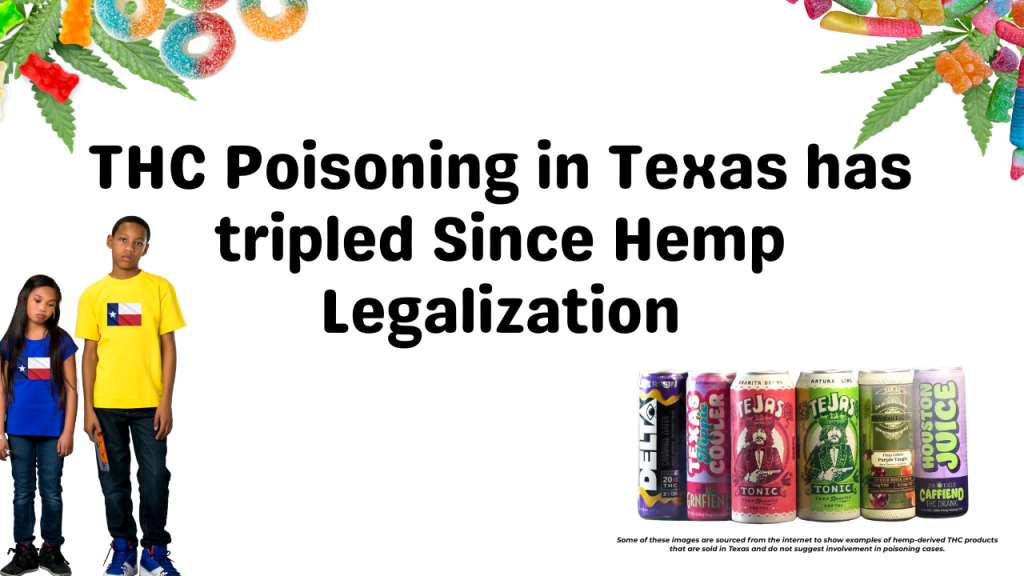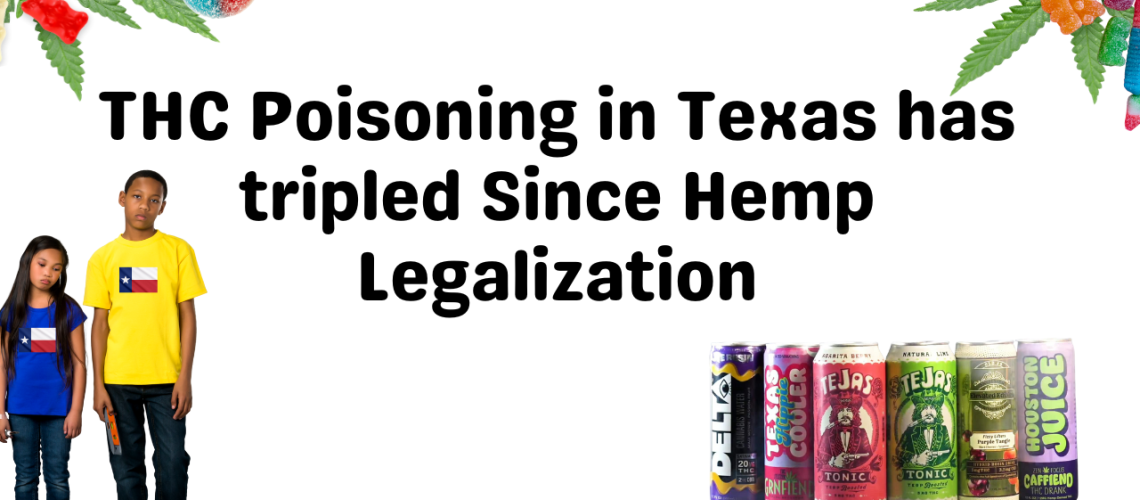Since Texas legalized hemp in 2019, THC-related calls to the Texas Poison Control Center have nearly tripled, with sharp spikes among very young children.
That surge aligns with the explosive growth of retail hemp-derived intoxicants such as delta-8 and delta-10 sold in gas stations, smoke and vape shops, and online, often in candy- and soda-like packaging that appeals to kids.
Texas data and national health warnings highlight an urgent public health problem that demands decisive action. Parents and communities cannot shoulder this burden alone; Governor Abbott must call a third special session, and the Texas Legislature must restore guardrails to protect Texas families by implementing a ban on retail THC products and supporting robust enforcement.
The Data: A Clear Spike After 2019
- THC-related poison control calls tripled after hemp became legal. Analysis of Texas Poison Center Network shows marijuana/THC poison-control calls climbing from 923 in 2019 to 2,592 in 2024 – a near threefold rise in just five years. This pivot starts right after hemp and hemp-derived THC began flowing into the marketplace.
- Very young children are at special risk. Texas Poison-control calls involving children five and under rose 495% from 2017 to 2022, underscoring how edible and beverage formulations put toddlers and preschoolers in harm’s way.
- State dashboards confirm the trend. The Texas Department of State Health Services’ (DSHS) Cannabinoid-Related Poison Center Calls dashboard documents year-over-year increases, with data sourced directly from the Texas Poison Center Network’s six regional centers.
- Minors make up a large share of cases. Research summaries drawing on Texas and national poison-data systems report that more than half of cannabinoid exposure cases involve people under 20, and roughly one-third involve children under 6. That pattern was held in Texas through 2023.
The timing is not a coincidence.
The Legislature passed HB 1325 in 2019, launching the state’s hemp program and inadvertently opening the door to psychoactive hemp derivatives, which are sold outside the tightly controlled medical program (T-CUP) and in over 8,000 retail locations throughout Texas. Texas does not have the resources or inclination to grow government enough to “regulate” such a predatory industry that sells these kid-friendly drugs.
Once a child ingests THC, there is no antidote; emergency departments provide monitoring and supportive care only, in some cases, intubation to support respiration.
In other states, such as Colorado, attempts to strictly regulate this industry have failed, even when child-proof packaging is mandated. The Rocky Mountain Poison and Drug Safety office reports kids aged five or younger exposed to marijuana have skyrocketed from 56 in 2017 to 151 in 2021 by eating edibles- gummies, cookies, drinks, and other products infused with THC.
Meanwhile, federal and national health authorities have repeatedly warned about delta-8 THC and similar semi-synthetic compounds:
- The FDA cautions that delta-8 products are not evaluated or approved, may be mislabeled, and pose serious health risks, especially for children and pets.
- The CDC Health Alert Network flagged rising availability and adverse events, including lethargy, ataxia (uncoordinated movements), and coma, with many cases tied to confusion between CBD and delta-8.
- America’s Poison Centers have tracked 10,000+ delta-8 exposure cases from 2021–2025, a window that overlaps with Texas’s sharp post-2019 surge.
Taken together, these data points make a straightforward case: liberalized hemp sales predictably produce more pediatric poisonings.
“Minor Effects” Is Not a Comfort to Parents or Ers
Pro-cannabis commentators sometimes note that many poison-control outcomes are “minor.” Parents who’ve watched a toddler become paranoid and hallucinate after eating THC gummies know there’s nothing minor about it.
Clinicians confirm no reversal agent exists; kids are monitored, given fluids or oxygen, and discharged only after hours of distress. These treatments tie up scarce emergency resources and leave families with traumatic experiences and state hospitals and insurers with exorbitant medical bills.
Texas shouldn’t wait for longitudinal harm to become undeniable years from now before restoring common-sense solutions, like not allowing THC to be sold in edibles and drinks.
How We Got Here: A Loophole, Not a Mandate?
Texans never voted to flood their neighborhoods with psychoactive products. The 2019 hemp bill legalized THC hemp (≤0.3% delta-9 THC by dry weight), which was a deception that allows a large amount of THC in every product and allows chemistry labs to convert legal CBD into semi-synthetic intoxicants (e.g., delta-8, HHC) and infuse them into candy-like edibles.
Those products can deliver a large amount of THC in one swallow. The public must know that as little as 10 mg of THC can cause psychotic symptoms.
This is not a victimless market. It’s a policy failure.
What Texas Must Do Now: Pass a Complete Ban on Intoxicating Hemp Products
The numbers don’t lie – Texas’ 2019 hemp loophole must be closed, and the only way to close it is to remove intoxicating hemp-derived THC products from the marketplace entirely. Anything less leaves children, teens, and communities exposed to the very risks lawmakers never intended when hemp was legalized.
- Partial measures won’t fix the problem. Age limits and packaging rules sound good on paper, but don’t work in practice. Bad actors thrive on loopholes.
- Synthetic conversion is the root cause. Products like delta-8, delta-10, THC-O, THC-P, and HHC aren’t naturally occurring in usable quantities or do not even exist in nature–– they’re lab-made intoxicants. The industry chemists will always be a step ahead of industry regulators.
- Allowing 0.3% of THC by dry weight allows a large amount of THC in every product. 0.3% basically means 3 mg of THC per 1,000 mg (= 1 gram) of total product weight. For example, a hemp gummy that weighs 3.2 grams can have 9.6 mg of THC. A handful of gummies that weigh 35.1 grams can have 105.3 mg of THC.
- Retail access means youth access. Convenience stores, smoke shops, and online sellers will never be a safe distribution system for psychoactive products. Even with ID checks, minors will get them, just as they do now with alcohol and nicotine.
- Public health comes before profit. Families and taxpayers should not be forced to bear the burden of ER visits, poison-control calls, and treatment, and long-term developmental harm, so that a handful of businesses can cash in on chemically altered hemp.
A total ban is the clear path forward. It eliminates the manufacture, distribution, and sale of hemp-derived THC products in Texas – ending the chaos and restoring the intent of the original hemp law. Texans did not vote for a backdoor marijuana market disguised as “legal hemp.”
If lawmakers truly want to protect kids and communities, they must stop the harm at its source. Close the loophole. End the retail free-for-all and Remove these dangerous products from Texas shelves for good.
Governor Abbott and the Texas legislators have a duty to shield children from preventable harm. The post-2019 surge in THC poisonings – especially among toddlers – demands an immediate course correction. Texans did not sign up for intoxicating hemp products to be sold as candy, food, and beverage items.
Citizens for a Safe and Healthy Texas urges lawmakers to close the hemp loophole that allows semi-synthetic intoxicants to sidestep safeguards. Texas families deserve peace of mind. The data is in; now, it’s time to act.
Aubree Adams, Director
Matt Poling, Medical Advisor
Jesse LeBlanc, Science Advisor

